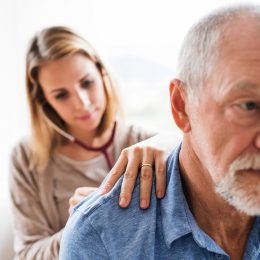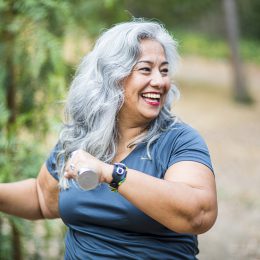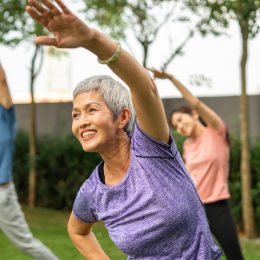Find Your Place: The Plate-Tap Challenge
This fun drill assesses your brain-body connection and fine motor skills.
How long does it take you to complete a task with your dominant hand? Now, how about your nondominant hand? In this video, SilverSneakers fitness expert David Jack explains how this quick, fun test can give you clues about your brain-body connection and fine motor skills.
You’ll need:
- Two 10-inch plates; average dinner plates will work
- Surface-safe tape
- A book or magazine large enough for you to rest your hand on
- A watch or clock
- Ideally, a partner to keep time on the watch or clock for you
Try the test now, then see what your results mean below. If you have a chronic condition or an injury that makes the test difficult, skip the test, but check out the tips below.
If You Were Able to Complete the Test Safely and Quickly with Both Hands
That’s a sign your brain-body connection and fine motor skills are in good health. Why that matters: To move your hands in the way you want, instructions from your brain (“tap left plate, tap right plate”) need to get to the muscles in your hands, and these muscles need to be able to move in the way they were instructed. At the same time, feedback from your hands (what you felt when you tapped the plate) needs to get to your brain. Your nervous system—made up of your brain, spinal cord, and nerves—makes this possible.
Want more ways to keep that brain-body connection strong? Try these four exercises that buff up your brain. Plus, to keep your hands fit for daily tasks, check out these five exercises that boost grip strength.
If You Had Difficulty Completing the Task—or Noticed a Big Difference Between Hands
That’s a sign you may need to talk to your doctor, especially if you’ve noticed other changes in how you move or feel. Your doctor can determine if there’s an underlying issue or injury, and the right treatment. Use this guide to make the most of your doctor’s visit.
What else can help: beginner-friendly, low-impact classes set to music that improve coordination, balance, and strength, like SilverSneakers Classic. You can go at your own pace, and many moves can be modified for your needs.
Subscribe to our newsletter
It's quick and easy. You could be one of the 13 million people who are eligible.
Already a member? Click to discover our 15,000+ participating locations.
Follow Us
If You Have a Chronic Condition or an Injury
Worried that you shouldn’t exercise if you have a condition that affects your nervous system and movement, like Parkinson’s disease? It turns out, staying active can help improve coordination, balance, and cognition—and it may even slow the progression of the condition. Check out these six rules for exercising with Parkinson’s disease.
If you have had an injury or medical event like a stroke, you’ll want to work closely with your health care team for a safe recovery. Your timeline and specific steps of recovery will depend on what you experienced, but primary goals are the same: to regain function and resume activity as much as possible. Ask these questions:
- Do I need additional medical treatment or physical therapy?
- When can I start exercising on my own again?
- What types of exercise are appropriate for me, and what types should I avoid?
- Is there anything else I can do to help myself with recovery? For example, your doctor may recommend taking good care of your emotional heath. Depression, which is common after serious medical events, can slow down recovery—but it’s treatable.
Check Your SilverSneakers Eligibility Instantly
SilverSneakers gives you free, unlimited access to more than 15,000 gyms and fitness centers across the nation, plus classes and tools designed to keep older adults strong and independent. Check your eligibility instantly here. Already a member? Get your SilverSneakers member ID and exclusive content by logging in to or creating your online account here.





